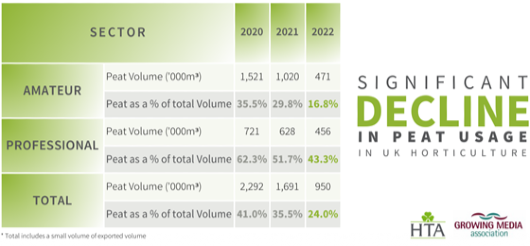
Initial results from a new report produced by the Horticultural Trades Association and members of its specialist group, the Growing Media Association, reveal a significant decline in the use of peat in environmental horticulture.
The report covers industry trends in growing media from 2021 to 2022. It highlights a positive shift towards more sustainable practices within the sector, with UK suppliers, growers, and retailers collaborating to develop alternatives.
Initial results from a new report produced by the Horticultural Trades Association (HTA) and members of its specialist group, the Growing Media Association (GMA), reveal a significant decline in the use of peat in environmental horticulture. The report covers industry trends in growing media from 2021 to 2022. It highlights a positive shift towards more sustainable practices within the sector, with UK suppliers, growers, and retailers collaborating to develop alternatives.
Headline figures show encouraging progress by the sector, with peat volume having almost halved in one year and the total volume dropping below 1 million cubic metres. The retail industry has shown a remarkable decrease in using less than half the volume of peat compared to the previous year. The percentage now stands at just 16.8% and is rapidly declining. Additionally, the professional use of peat has fallen below 50% for the first time.
The full report of the Growing Media Monitor, developed annually by the HTA, GMA, the Agriculture and Horticulture Development Board, and the Department of Environment Food and Rural Affairs, will be available in the coming weeks. The early headlines, however, mark a significant milestone in the industry's ongoing efforts to promote sustainability and reduce environmental impact. The HTA is encouraged to share this news and continue working towards a more sustainable future.
However, many of the UK’s tree and plant growers face several challenges to transition to 100% peat free in the near future and have called for their research and development trials to continue until 2030. This will allow professional peat-free mixes for growing the thousands of plant types and species at the quality and quantity required.
James Barnes, Chair of the HTA, commented on the report's findings, stating: "The results of this report are a testament to our industry's dedication to sustainability, taking significant and effective steps towards reducing peat use, and that industry-led initiatives are already yielding results. We remain committed to removing peat from compost in retail by the end of 2024. However, to accelerate our progress towards a peat-free future, we urgently need all stakeholders, including government, to focus efforts on addressing the barriers to alternatives and a successful transition. We remain hugely concerned about a drastic shift from 2030 for ending-peat use for professional purposes and the impact this would have. By working together, we can ensure a more sustainable future for horticulture and protect our planet for generations to come."
Environment Minister, Trudy Harrison, said: “It is encouraging to see today’s figures which show the professional sector making good progress in moving towards using effective peat-free alternatives. Our peatlands play a crucial role in locking up carbon, providing habitats for wildlife and helping with flood mitigation.
“We will continue to support and work with the professional sector as we move towards a fuller transition to peat-free by 2026 and a complete end to horticultural use of peat by 2030.”